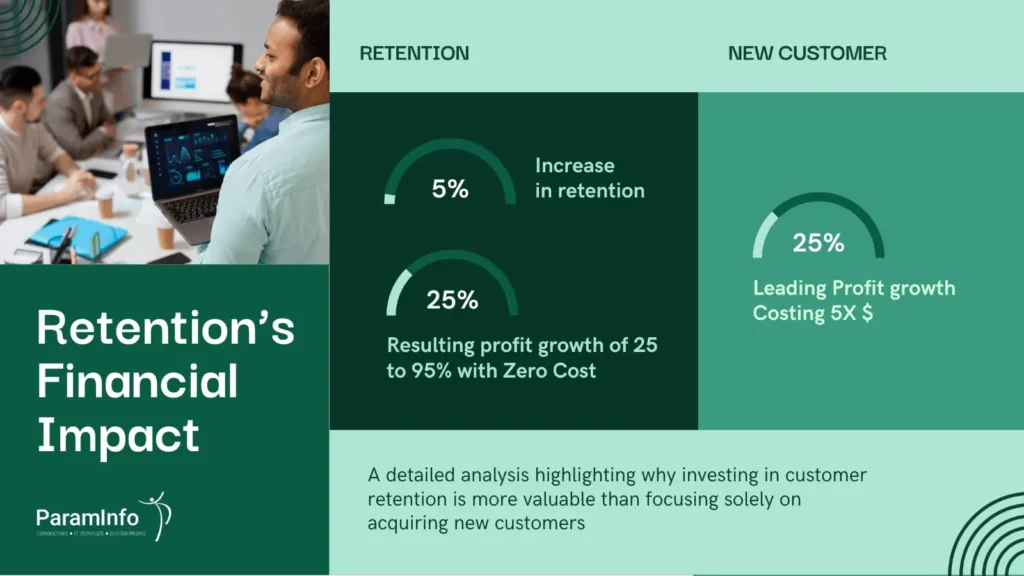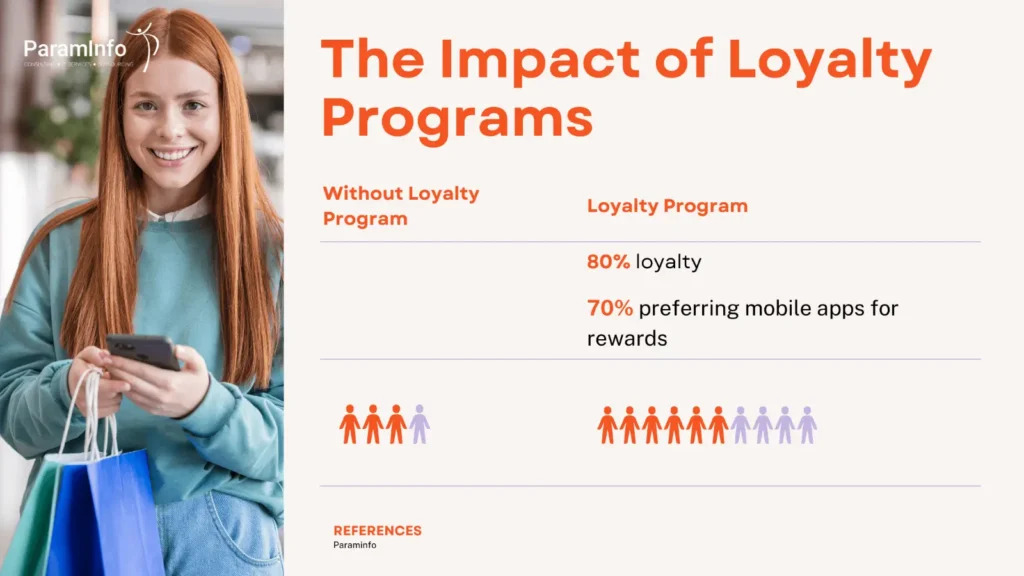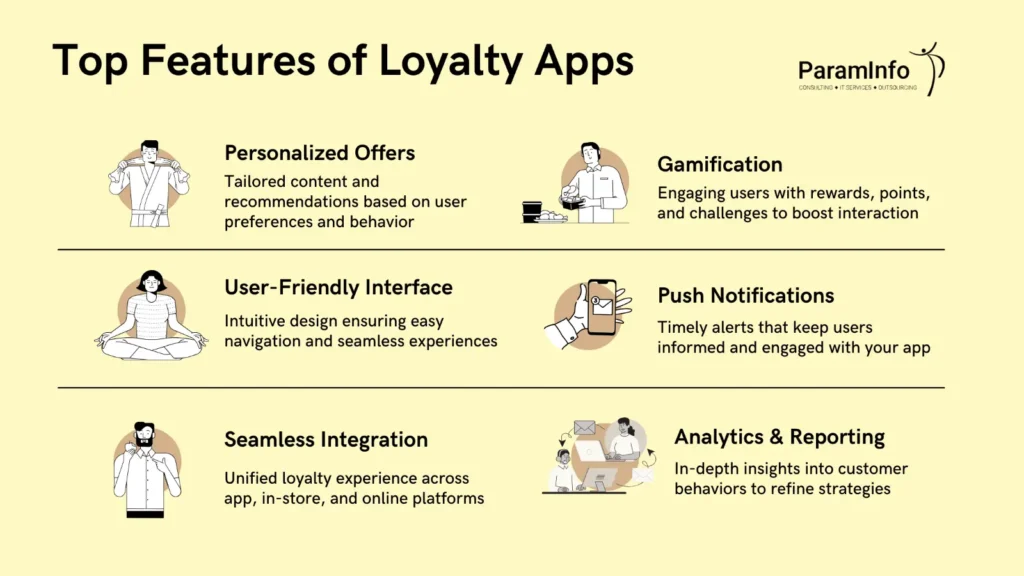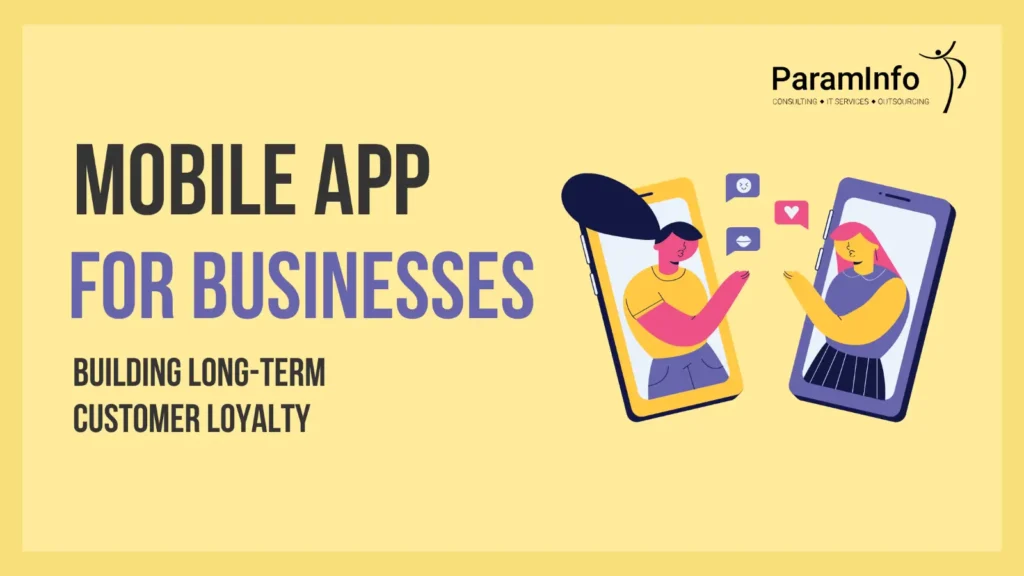In today’s fast-paced digital world, businesses are always looking for new ways to connect with customers and build brand loyalty. One effective method to achieve this is through mobile apps.
Mobile apps for businesses can be a powerful tool for boosting customer loyalty. They help create a closer and more personal relationship between your customers and your brand. When used effectively, these small but powerful apps can greatly improve the customer experience and drive business growth.
Whether you’re an experienced business owner or just starting your entrepreneurial journey, understanding how Mobile App Development Company can enhance customer engagement and loyalty is essential.
In this article, we’ll provide a simple, step-by-step guide with actionable strategies to help you understand how to use mobile apps to improve customer loyalty and retention.
But before we delve deep into the subject, let’s first understand what customer loyalty is.

Customer Loyalty & Retention
Client Retention & Loyalty
The enduring bond between your brand and your customers that encourages continued interaction and repeat business is known as customer loyalty. It doesn’t happen overnight; it takes time to develop this loyalty. It frequently results from giving your clients an exceptional experience that makes them happy and encourages them to return.
Also Read: WordPress SEO Tips and Techniques to Improve Your Website’s Rankings
No matter what business you’re in, maintaining and growing your customer base is crucial to your brand. According to research, a just 5% increase in client retention can result in a 25% to 95% increase in profitability. Furthermore, acquiring new customers is five times more expensive than retaining current ones.
Nevertheless, many companies make the mistake of focusing all of their efforts on acquiring new clients while neglecting their existing clientele. Prioritize keeping your current clientele before creating plans to attract new ones if you want to grow your company.
Mobile Apps: A Key Tool for Boosting Loyalty
People of all ages use cellphones these days, and many people are rarely seen without one. As a result, smartphones are the ideal tool for increasing consumer loyalty.
In fact, 88% of mobile internet usage is devoted to apps, per a survey by market research firm eMarketer. What’s causing that, then? It’s because—at least the good ones—mobile apps provide accessibility and ease!
Because of these factors, mobile apps are currently the ideal way to build and increase client loyalty, and the best part is that your customers are already using them.
Creating an app that will wow your consumers is an important part of the process, but it doesn’t mean that your effort is finished. If you want to maintain and grow your customer loyalty as a mobile marketer, you need to use strategies that work.
How Mobile Apps Can Increase Customer Loyalty?
Mobile apps are a powerful tool for enhancing customer loyalty and retention. Unlike websites, which fade from view once the browser tab is closed, apps provide a consistent, semi-permanent connection with your customers.
The potential for fostering loyalty through mobile apps is vast. Features like push notifications and deeper access to customer data enable businesses to engage users in meaningful ways.
Let’s go deeper and understand why mobile apps for businesses are so effective in driving customer loyalty:
- Having your app icon on a customer’s phone keeps your store and brand at the forefront of their mind. With push notifications appearing on their lock screen, you can maintain a constant presence.
- A mobile app simplifies the shopping experience with an intuitive, mobile-friendly design, making it more likely for customers to return and shop with you again. The increased convenience—accessing your app with a single tap, navigating without distractions, and shopping from anywhere—encourages repeat visits and fosters loyalty.
- Additionally, apps offer a more effective customer service channel, enabling direct communication with your customers. Since you fully own the app, you can collect first-party data to gain insights into your customers’ preferences and create a more personalized shopping experience.
- When customers download your app, it creates a subconscious bond with your brand, deepening their connection. While this connection develops naturally, it also requires ongoing nurturing to thrive.

Effective Mobile App Techniques to Increase User Loyalty
Communicating Through a Variety of Mobile App Channels
Mobile applications offer a variety of channels that you can use to communicate with your audience. Each app will have its strengths; therefore, it is important to use a combination and not get stuck to only one channel.
Push notifications from mobile applications are an excellent approach to inform your clients of pertinent updates, which will help them remember your brand. Push notifications will entice users to open your app or reactivate dormant users by displaying the message or content on their lock screen.
Any client loyalty program should include app push alerts, but you shouldn’t undervalue the importance of in-app communications.
The user receives in-app messages while using your program, as the name suggests. This kind of communication might be triggered by the user’s actions, like when they successfully onboard your software, or it can be used to share promotions or product updates. They are ultimately designed to keep your most active users interested.
Take Advantage of Geolocation Messaging
By enabling you to provide pertinent material depending on your clients’ present location, geolocation messaging improves their experience. This is a particularly useful tactic for merchants and eateries, as it allows them to notify clients about sales or new menu items while they are in the area. They can increase client satisfaction and loyalty by sending the appropriate message at the proper time.
Give Your Customers a Pain-Free Shopping Experience
Transform your mobile app into a perfectly optimized shopping experience.
Many mobile websites merely shrink their desktop versions to fit smaller screens, which isn’t ideal for users.
Your app should feel tailored specifically for mobile users. Focus on minimizing text input, optimizing touch screens, and simplifying the checkout process.
When your app offers a smoother and more user-friendly experience, customers are more likely to prefer it over your website, leading to increased loyalty.
Establish a Robust Loyalty Program
Customers do, in fact, want to feel valued and adored by brands, and a loyalty program can be a fantastic method to do this. Research indicates that over 80% of US consumers are more devoted to companies that run special incentive programs.
Furthermore, mobile applications are the ideal medium because over 70% of consumers are more inclined to join a loyalty program if they can access loyalty cards and prizes on their phones.
A mobile app’s loyalty features can successfully promote engagement and downloads. For example, you may give new users 10% off their first in-app purchase or 10% off when they download your app. Additionally, by offering incentives for transactions done through the app or granting loyal consumers exclusive access to new products, these incentives might encourage repeat business.
Also Read: The Importance of SMTP Server warm up in Email Marketing
The key to a successful mobile app loyalty program lies in two main factors. First, it must be user-friendly; if the process is complicated, customers are less likely to participate, undermining your efforts to foster loyalty. Second, the offers and content should be personalized to each user, avoiding irrelevant information that could overwhelm them. By focusing on simplicity and relevance, you can create a loyalty scheme that truly resonates with your customers.
Create a Referral Program
Referral programs are an excellent tool to employ in combination with mobile apps, just like loyalty programs.
Customers who recommend new clients to your business might earn points or prizes through a referral program. This is a fantastic method to increase the size of your current, devoted clientele by utilizing them.
Referral programs encourage more loyalty from current users when they refer your app to others, gradually transforming them into devoted supporters.
Utilize Data for Effective Personalization
Ninety-one percent of customers are more likely to shop with brands that offer personalized deals and recommendations. An article from Harvard Business Review revealed that companies are losing $1 trillion annually to competitors due to a lack of consistent relevance. This highlights the crucial role of personalization in your customer loyalty strategy, with data being the foundation of successful personalization.
Those days are gone when you used to assume ‘what your customers wanted from your brand,’. Now you must leverage the huge amount of data that you collected from your users and use this data to give your customers what they want, when they want and where they want it.
Mobile apps are your best ally in this regard. Unlike desktop and mobile websites, mobile apps for businesses provide deeper insights into your customers’ lives, allowing you to track key activities and information that can enhance your personalization efforts.
For instance, if you’re a clothing retailer and notice a customer has recently purchased a shirt, you could send a push notification or in-app message—based on their preference—saying, “We hope you love your shirt! Pair it with these jeans for the perfect outfit!”
This kind of relevant, personalized content strengthens your relationship with customers and boosts their loyalty. However, if you don’t leverage your data to drive personalization, your efforts will fall flat.

Key Features of Loyalty Mobile Applications
Personalization: To maximize the effectiveness of a loyalty mobile application, it is essential that it is customized to reflect the individual preferences and behaviors of each user. Personalization can manifest through features such as tailored recommendations, specific promotions, and pertinent content. For example, a loyalty application for a fashion retailer might offer personalized product suggestions based on a customer’s previous purchases or browsing patterns. Achieving this level of personalization relies heavily on the utilization of customer data and analytics. By gathering and analyzing insights regarding customer preferences and behaviors, businesses can craft a more individualized experience that resonates with each user.
Gamification: The incorporation of gamification into the loyalty experience enhances interactivity and engagement by introducing game-like elements such as points, badges, challenges, and rewards. This feature encourages customers to engage with the application more frequently and to increase their spending in order to earn rewards and achieve higher status levels. Furthermore, it cultivates a sense of friendly competition among users, which can further enhance engagement and loyalty.
User-Friendly Interface: A loyalty application designed by a professional agency, adhering to established mobile application development guide should be intuitive and easy to navigate. This ensures that users can easily access and utilize its various features and rewards. The application should provide a seamless experience across different devices and platforms, including smartphones, tablets, and desktops. Additionally, employing clear and concise language can significantly improve the user experience and foster greater engagement with the application.
Analytics & Reporting: Loyalty applications that feature comprehensive analytics and reporting capabilities allow businesses to gather valuable data regarding customer behaviors and preferences. This information is crucial for refining marketing strategies, improving customer experiences, and identifying growth opportunities. Effective analytics tools offer insights into key metrics such as customer engagement and retention rates.
Future Trends in Customer Loyalty Mobile Applications
The realm of customer loyalty mobile applications is in a state of constant transformation. To maintain a competitive edge, businesses must keep abreast of emerging trends and adjust their strategies accordingly. Below are several significant trends that are influencing the future:
Artificial Intelligence (AI) and Machine Learning (ML): The integration of AI and ML is becoming increasingly vital in mobile applications, facilitating enhanced personalization. ML and AI in mobile app development will allow for the analysis of user behavior, customization of content, and provision of more pertinent recommendations, thereby improving user engagement and strengthening loyalty.
Augmented Reality (AR) and Virtual Reality (VR): The application of AR and VR technologies can foster immersive experiences that greatly enhance user interaction. For instance, retail applications can allow users to virtually try on apparel or visualize how furniture would appear in their living spaces, thereby enriching the shopping experience and increasing user engagement.
Voice Assistants: As voice-activated devices gain popularity, the incorporation of voice assistants into mobile applications provides a hands-free and user-friendly experience. This trend is particularly significant for applications in industries such as healthcare, navigation, and smart home technology.
Selecting an Appropriate Partner for Loyalty Mobile Application Development
Choosing the appropriate partner for mobile app development is crucial for the success of your loyalty application initiative. Below are several important considerations to assist you in identifying the most suitable mobile app development partner for your loyalty mobile app:
Emphasize Experience: Seek a development partner with a proven history in mobile app development, especially within the loyalty domain. Request examples of their past projects and examine client testimonials and ratings.
Review Their Technology Stack: Confirm that the agency employs cutting-edge technology, adheres to established mobile application development guide, and remains informed about the latest trends in mobile app development. This will help ensure that your application is contemporary, secure, and capable of scaling.
Consider Pricing: Although cost should not be the only determining factor, it remains a significant aspect. Opt for a mobile app development agency that provides transparent pricing models and aligns with your financial plan.
Final Thoughts
In summary, loyalty mobile applications can significantly enhance businesses’ efforts to build strong customer relationships and improve retention rates. By incorporating vital features such as an intuitive interface, push notifications, and comprehensive analytics, organizations can create an engaging mobile experience that promotes customer loyalty.
Nonetheless, the process of developing and launching a loyalty app presents its own challenges, including the necessity for a proficient development team and budget constraints. Thus, choosing the right mobile app development partner is a pivotal element in ensuring success.
By taking these elements into account and partnering with the appropriate agency, organizations can fully leverage the capabilities of a loyalty mobile application, thereby fostering improved success and greater customer engagement.
FAQ’s
1. Why is customer loyalty important, and what does it mean?
The term “customer loyalty” describes the enduring relationship that exists between a company and its customers, which leads to recurring business and sustained involvement. This is important since loyal customers are less likely to switch to competitors, spend more, and suggest your brand to others. Profits can be greatly increased by keeping current clients, which frequently requires less money than finding new ones.
2. How can customer loyalty be improved by mobile apps?
Users have a more engaging and customized experience thanks to mobile apps. Through personalized marketing, push notifications, and convenient access to goods and services, they enable companies to interact directly with consumers. This ease of use strengthens relationships and promotes recurring engagements.
3. What functionalities should a loyalty app have to increase user engagement?
User-friendly navigation, personalized suggestions, loyalty programs and incentives, push notifications for promotions, and connectivity with other channels (such as online and in-store purchases) are all crucial components of a loyalty app. These features promote regular use and improve the client experience.
4. How can companies keep their customers loyal after developing an app?
Following the creation of a mobile application, companies want to concentrate on ongoing interaction. This can be accomplished by regularly updating the app with new features, gathering user feedback, doing content personalization according to user preferences, and by maintaining efficient in-app messaging and push alerts.
5. What part does data analytics play in enhancing customer loyalty?
Data analytics sheds light on the preferences, behavior, and levels of engagement of customers. Businesses may improve their marketing tactics, tailor consumer experiences, and spot trends that support loyalty programs by examining this data. Gaining a deeper understanding of your clients helps you to better serve their needs, which eventually increases loyalty and retention.
ParamInfo is a leading global IT services and solutions provider, specializing in mobile app development, digital transformation, and software engineering. With a strong focus on innovation and customer-centric solutions, ParamInfo empowers businesses to accelerate growth through cutting-edge technologies. From developing scalable mobile apps to offering comprehensive digital solutions, ParamInfo helps clients achieve their business goals with agility and precision. For more information, visit ParamInfo.com
